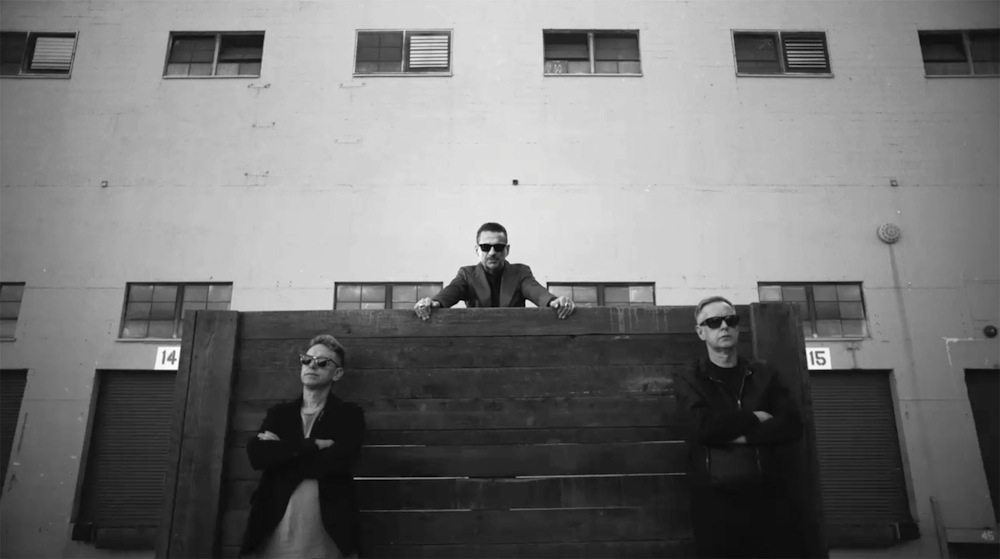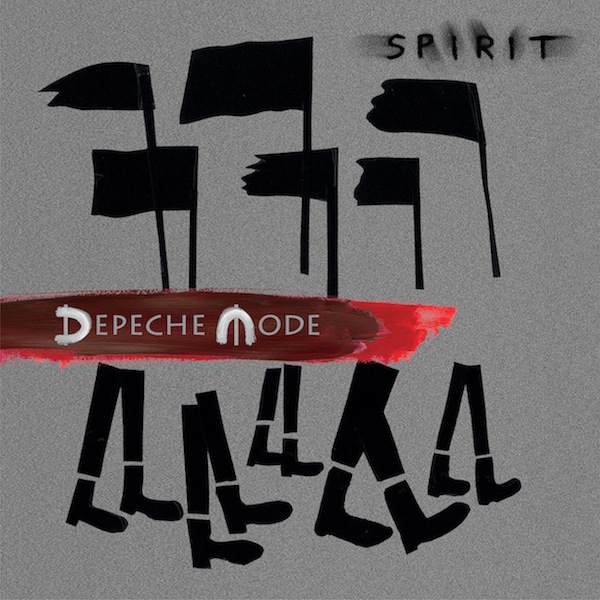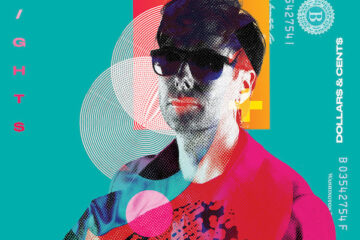Basildon’s finest pull the trigger on politics for their latest studio release…
“People, what are we thinking? / It’s shameful, our standards are sinking / We’re barely hanging on / Our spirit has gone”.
These couplets could easily apply to the downward trajectory that the band have been on, creatively, since Playing The Angel, but they actually belong to the final track on Depeche Mode’s disappointing 14th studio album Spirit, a collection of politically-imbued and socially-aware synth rock songs for the masses, housed once again in an uninspiring Anton Corbijn sleeve .
By the band’s standards, the album was recorded very quickly with former Simian Mobile Disco member James Ford, who has helmed albums by the likes of Mumford and Sons, Foals and Florence and the Machine (he has also recorded two albums with indie super group, The Last Shadow Puppets). Lead singer Dave Gahan observed: “He’s not just a great producer, he’s a great musician. So he was able to guide us. Martin had written some great songs and demoed them and I had too, so he was able to take those songs and take them to another level.” Reportedly, Ford also acted as a mediator, diffusing some initial tensions between Gahan and main songwriter Martin Gore.
Released just a few weeks after President Trump’s inauguration, ‘Where’s The Revolution’ arrived via a fanfare of flags and fake beards. Spirit’s opening statement revealed a more sonically-challenging direction and set the tone for much of the new opus, showcasing some more aggressive and politicised wordplay: “They manipulate and threaten / With terror as a weapon / Scare you till you’re stupefied / Wear you down until you’re on their side”. As perfectly pitched as it is within today’s political climate, the production is shambolic. Despite featuring some nice slide guitar, the transition from the verses to the chorus’s snarling, rallying cries is clumsily executed, while the meandering “train is coming-engine is humming” middle-eight equally grates. Mercifully, the single version is a minute shorter.
By contrast, ‘Going Backwards’ is a pretty impressive album opener. It starts with some big piano chords and understated guitar. Slowly building via some urgent-sounding synth work to heighten the drama, Gore produces some suitably bleak and vivid imagery, which Gahan sonorously delivers: “We can track it all in satellites / See it all in plain sight / Watch men die in real time / But we have nothing inside / We feel nothing inside.”
Following the cacophonous rhythms of ‘Where’s The Revolution’, the pace slows with ‘The Worst Crime’, a more ambient and less cluttered production, with Ford allowing some much-needed space. Though not bursting with melody, Gore once again delivers some impressively harrowing lyrics: “There’s a lynching in the square / You will have to join us / Everyone’s going to be there / We’re setting up the truss”. Gahan was sufficiently impressed when discussing the track with Rolling Stone magazine: “We can all talk about whatever is going on until we’re blue in the face but you have to take real action, and sometimes we don’t know what that looks like. Individually, I believe people are inherently good, but we’re really distorted by the information we get and we act out on that information out of fear.”

‘Scum’ is the album’s most discordant and angry offering, featuring some more vitriolic swipes from Gore: “You wouldn’t even offer up your crumbs / To the dying, and the crying / You’re dead inside, you’re numb / You’re hollow, and shallow / Your empty life is done”. It’s the album’s definitive ‘call-to-arms’ statement, with Gahan enunciating the line “pull the trigger” in almost comical fashion. However, the polyphonic production is chaotic and distorted, and symptomatic of much of Ford’s seemingly cut-and-paste methods.
‘You Move’, a rare Gahan/Gore co-write, takes the listener on a more hedonistic detour from the previously bleak soundscapes, with Gahan declaring “I like the way you move / I like the way you move for me tonight” against a backdrop of electronics that recall Computer World-era Kraftwerk.
Since making his songwriting debut on Playing The Angel with the excellent ‘Suffer Well’, Dave Gahan has steadily consolidated his reputation as a more-than-capable lyricist. His work on the last Soulsavers album attests to this, while ‘Broken’ was arguably the best track on Delta Machine. The other-worldly ‘Cover Me’ is probably the best track on Spirit, described by Gahan thus: “It’s about a person who travels to another planet only to find that, much to his dismay, it’s exactly the same as earth. It’s a different planet but the same. He really can’t get away from himself. If he wants things to change, he’s going to have to implement it.” Musically, it follows a similar krautrock path as the previous track, replete with some suitably sinister synth sounds.
‘Eternal’ marks Gore’s lead vocal debut on Spirit, an inoffensive ephemeral ballad in which the protagonist declares his eternal love in the midst of an apocalyptic horror: “I will be there for you, always / And when the black cloud rises / And the radiation pours / I will look you in the eye / And kiss you.”
PREORDER NOW
Described by its writer as an internal monologue, Gore declared ‘Poison Heart’ to be Dave Gahan’s best song to date. Employing a more stripped-down production, with some characteristically tremulous backing vocal work from Gore, this is something of a medium-paced filler.
The pulse is raised on the somewhat repetitive ‘So Much Love’, which almost descends into self-parody with lines such as “There’s a fire in my veins / The desire causes pain”. But, with it it’s Neu!-like percussive drive and creepy synths, this perfectly serviceable synth-pop number just about wins through.
“Corporations get the breaks/ And keep everything they make” sings Gahan on ‘Poorman’, another distortion-heavy filler that, lyrically, echoes ‘Everything Counts’. Disappointingly, the melody is nowhere near as memorable.
Things improve with Gahan’s ‘No More (This Is The Last Time)’. Working within a more conventional synth-pop framework, the album’s most memorable chorus finally arrives: “This is the last time / I say goodbye / The last time / Then we won’t have to lie.”
Final song ‘Fail’, featuring another Gore vocal and some impressive industrial experimentation, serves as something of an album recap and, true to form, ends on a general note of hopelessness; its writer coming to the conclusion that “we’re fucked” and “we’ve failed”.
Between 1986 and 1993 Depeche Mode released a quartet of peerless albums. Outside of these Alan Wilder-less parameters, each subsequent new release has been – and will continue to be – compared with this body of work. To their credit, the band aren’t interested in becoming a heritage act such as The Human League and have continued to evolve and experiment, both via their regular-as-clockwork album releases and their attendant solo projects. The fanbase they’ve amassed since Ultra will of course be delighted with Spirit. But, as impressive as it is lyrically, it’s an often challenging and unsettling listen that doesn’t quite meet up to its billing as “the most energized Depeche Mode album in years.”
Spirit is released 17th March 2017 on Columbia Records.
- QUEEN’S MACHINES – How Music Changes Through The Years (1979 – 1984) - July 25, 2021
- SUGAR RUSH – The Story of ‘Sugar Tax’ - May 7, 2021
- Survival – The Story Of ‘Machine and Soul’ - April 30, 2021










